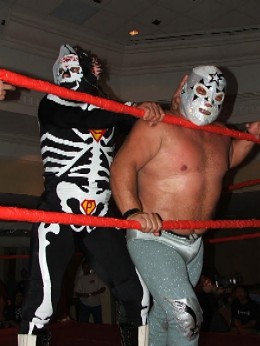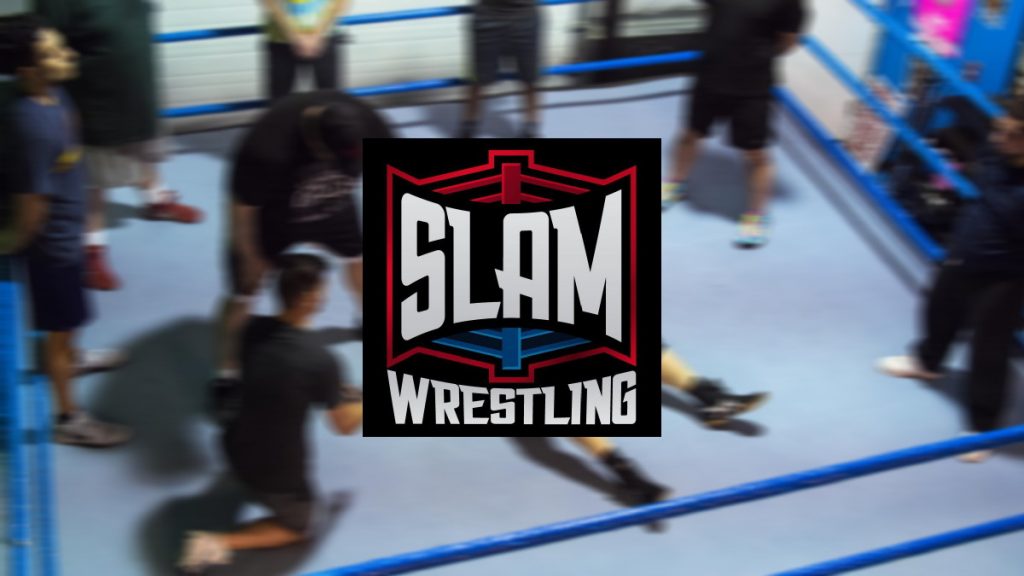CONCORD, ON – It was a busy night for Rob Etcheverria and Steve Cvjetkovich. Busy may in fact be an understatement in overseeing the multitude of responsibilities and surprises that come with running an independent wrestling show.
On top of that, they also have to prepare for their own matches, Etcheverria who competes as Rob Fuego and Cvjetkovich as the masked grappler Kobra Kai.
“It was the craziest night you could ever have,” said an exhausted Etcheverria in a post-show interview with SLAM! Wrestling at the debut Warrior 1 Wrestling show held in Concord, ON this past May. “I’m happy everybody turned out for it and I hope everybody had a good time.”

Super Parka chokes out Super Astro during their bout for Warrior 1 Wrestling in Concord, ON. – photo by Corey David Lacroix
The event encompassed a diverse selection of wrestling talent, including various independent talents from Ontario and topped off with marquee international names such Joe E. Legend, Super Parka, Super Astro, Chris Sabin and The Amazing Red.
“I thought the crowd was really hot, the guys are amazingly talented. Any one of those guys could have been the main event,” commented Cvjetkovich.
Be assured, planning out matches and setting up the ring are but minute distractions in comparison to a far greater concern both Etcheverria and Cvjetkovich have, and that is getting young, inexperienced wrestlers a chance to learn their trade.
The pressure to achieve this is ever present for Etcheverria, holding the post as head trainer of the Toronto-based Square Circle Training school. “I want them (students) to be on good, professional shows. Shows that will give them exposure so they can go on to bigger and better things. I send my students to other promotions that I know. I don’t mind working with other people. I don’t want them to stay here forever and, if this is what it takes to get them out there, then I’m going to do it.”
It was some years ago that Cvjetkovich approached Etcheverria about opening their own wrestling school. At that time, Etcheverria was the head trainer at the now defunct Apocalypse Wrestling Federation (AWF).
“He was training guys at another school and not getting paid for it,” recalled Cvjetkovich. “He was bitchin’ and moanin’ as often as he does about wanting to open his own school. I said ‘I’ll do it with you. We’ll be partners.’ He said ‘Why the hell do I need you?’ I said ‘If you didn’t need me, you would have done it by now.’ The next day I knocked on his door and I said ‘Here’s a wrestling ring. Where do you want to do this?'”
Square Circle Training now holds the unique title of being Toronto’s only advertised professional wrestling school. But once students acquire their minimum skills needed for the ring, the real test for them begins in the current, fractured wrestling scene.
In the bye-gone era of professional wrestling, there were no worries for up and coming wrestlers. They could travel throughout the continent, traversing the numerous promotional territories that offered no shortage of opportunities to wrestle, travel and make money.
But this is the year 2005.
Gone are the territories, replaced by one-show-a-month independent groups, where wrestlers more often than not will make little, if any money, for their in-ring efforts. Etcheverria is hoping he can help organize regular shows for local wrestlers. “Doing a couple a shows here a month you’re better off, it’s safer than being on the road. We’re trying to build this area up again.”
The area in this case is Toronto, a city with a proud and vibrant history for professional wrestling. Yet sadly, the independent wrestling scene in recent years is but a shadow of the former glory days of packed houses at the famed Maple Leaf Gardens.
“I don’t know why, Toronto is the biggest city in Canada,” said Etcheverria. “Other wrestling shows come here, they sell out. Why can’t we do three-quarters of that?”
Many within the industry lay blame at the feet of the Ontario Athletic Commission (OAC), the body that regulates professional wrestling on behalf of the provincial government of Ontario.
With no shortage of upfront costs and insurance requirements, it has become the bane of both wrestlers and promoters who maintain the government entity is strangling what indy wrestling scene currently exists.
“It’s been terrible here. The market for wrestling is just atrocious,” said Cvjetkovich, commenting on the struggles of independent promotions running shows in lieu of the OAC regulations. “You have to have a very high liability insurance which is almost impossible to obtain. It’s basically impossible for someone who’s not a millionaire to run a wrestling show and the chance to turn a profit and run a second show.”
As such, many wrestlers must journey to cities such as Montreal, where wrestling is not regulated by the province of the Quebec, or take the chance crossing the border into the United States. In the later case, most wrestlers do so minus a work visa and as such, run the risk of their true intentions being discovered by U.S. custom agents. Some will merely be told to turn around and head home, while others will face legal, multi-year expulsions.
“A lot of guys have to travel eight to 10 hours out of the city, out of the country to wrestle five to 10 minutes. It’s a big toll,” told Etcheverria.
But with the Warrior 1 Wrestling promotion (lead by Steve Cvjetkovich’s brother Nick Cvjetkovich, aka Sinn, formerly of TNA), hopes are high that live events can now be held on a regular basis, giving Ontario workers a chance to shine in the ring, along side former and current stars of the business.
“I want to have the older talent, blended with newer talent and put on a solid show,” said Sinn, who is assuming the role as event coordinator for Warrior 1 Wrestling.
“I want to bring names in and mix them with guys that are really talented, they’re just young and haven’t had the TV time. I want to offer that and build these guys so people will treat the local guys as a commodity and not just taking 10 steps underneath the brought-in name guy.”
Sinn and the rest of his team will put that vision to the test this month at the promotion’s Pro Wrestling LIVE! show on June 26 at the Oshawa Civic Centre, headlined by Samoa Joe vs Raven with Mick Foley as the special referee. The pressure will no doubt be on to deliver an event that sets the company apart from the vast majority of independent showings.
“Fans are so used to these little dinky indy shows,” said Sinn, adding that all efforts will be made to put on a professional looking spectacle that fans will want to come back to. “If the fans respond, that will just give us a budget to do more and better shows. I want the fans to have a good show and I want the wrestlers to have a good show to perform at.”
